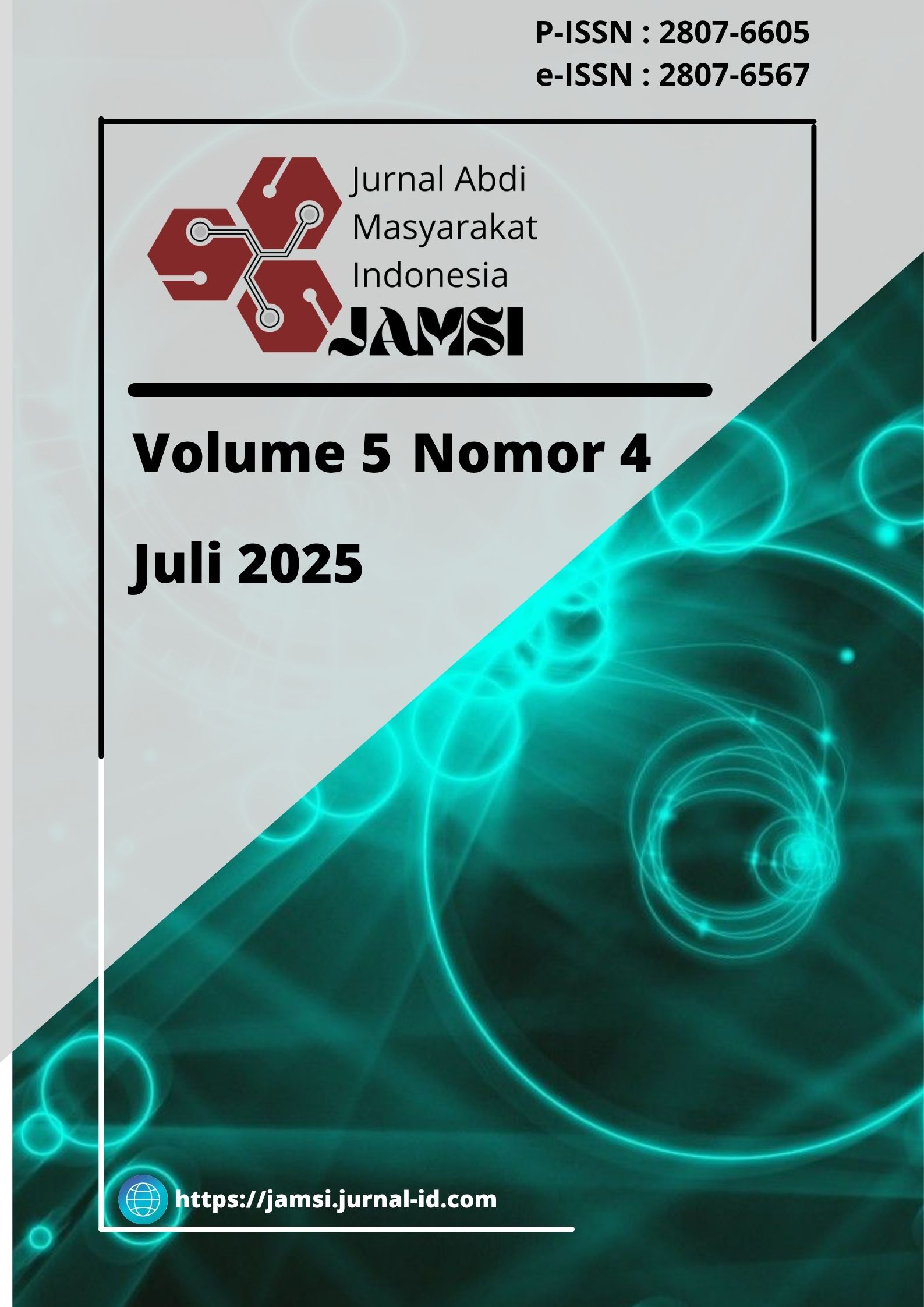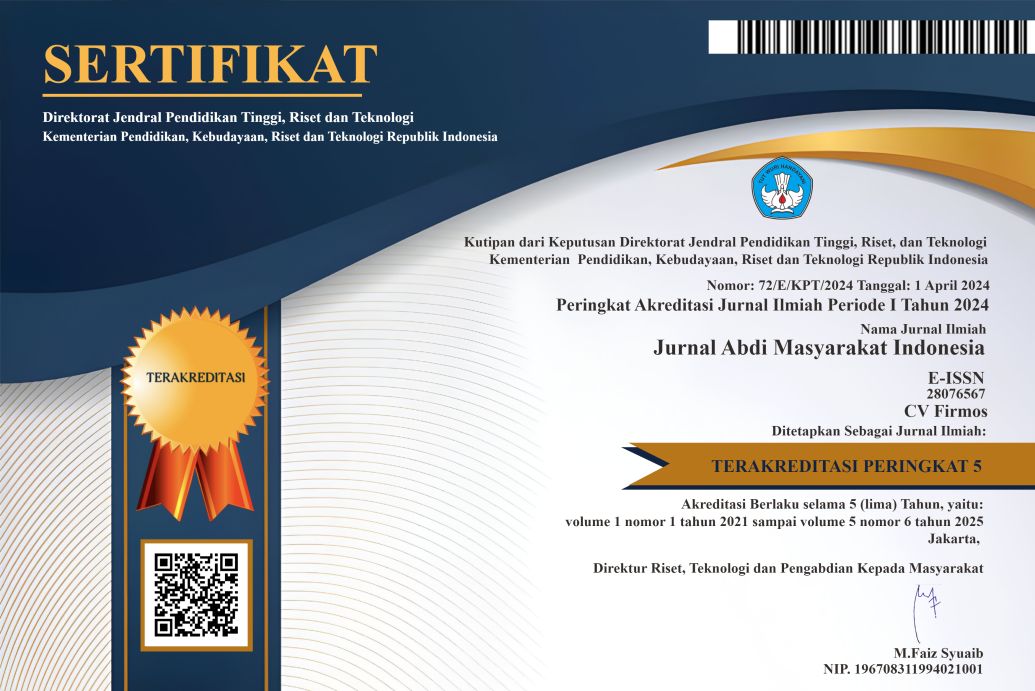Coaching and Mentoring Group Pimpinan untuk Meningkatkan Kinerja SMK Telkom Bandung-Jawa Barat
DOI:
https://doi.org/10.54082/jamsi.2010Kata Kunci:
Coaching dan Mentoring, Manajemen Team, Peningkatan BerkelanjutanAbstrak
SMK Telkom Bandung sebuah Lembaga Pendidikan Vokasi menengah merupakan lembaga pendidikan dibawah pengelolaan Yayasan Pendidikan Telkom. SMK Telkom Bandung ini berdiri dari sejak 2013 dan terus mengalami perkembangan yang cukup menggembirakan pada tahun-tahun berikutnya. Namun sejak tahun 2022 kinerja SMK Telkom Bandung mulai mengalami penurunan dalam capaian penerimaan mahasiswa baru dan keuangan. Sehingga perlu di berikan Coaching terhadap para leader SMK Telkom Bandung untuk dapat melakukan continuous improvemen. Kegiatan ini dilaksanakan oleh Team Coaching FEB Universitas Telkom dalam bentuk pengabdian Masyarakat. Pada awal pelaksanaan dilakukan pemaparan materi konsep manajemen Contiuous Improvemen, dimulai dengan membedah data-data turunya kinerja SMK Telkom Bandung. Selanjutnya diberikan konsep model dan teori tentang strategi menjalankan Continuous Improvement secara efektif dan efisien. Pada Langkah selanjutnya dilakukan diskusi untuk mendalami sebab penurunan kinerja dan diberikan tugas untuk membedahnya serta membuat rencana program perbaikan. Setelah dilakukan kegiatan Coaching dan mentoring terjadi peningkatan kinerja. Dibidang admin Kehadiran guru meningkat dari 89% menjadi 92%, CCR meningkat dari 91,5% menjadi 94,08%. Keterlambatan Siswa menurun tajam dari 42 menuju 6 siswa. Kehadiran Guru dikelas meningkat dari 94% menjadi 96%.
Referensi
Abidin, Z., Timur, T. J., Management, C., & Participation, S. (2024). Effective Classroom Management as a Quick Solution to Improve Student Participation and Motivation in the Learning Process. 75–88.
Arifin, S. (2024). The Effect of Teamwork and Organizational Commitment on Employee Performance. 07(02), 903–908. https://doi.org/10.47191/jefms/v7-i2-09
Askari, G., Asghri, N., Gordji, M. E., & Asgari, H. (n.d.). The Impact of Teamwork on an Organization ’ s Performance : A Cooperative Game ’ s Approach. 1–14.
Dewantoro, R. W., Arfan, S. Y. N., & Rizal, R. A. (2022). Analysis Of Right And Wrong Use Of Mask Based On Deep Learning. Journal of Informatics and Telecommunication Engineering, 6(1), 336–343. https://doi.org/10.31289/jite.v6i1.7582
Elkadi, E., & Sharaf, R. (2023). The Impact of Positive Discipline on Students’ Well-being and Academic Achievement: A Case of International School in Cairo. European Scientific Journal, ESJ, 19(16), 1. https://doi.org/10.19044/esj.2023.v19n16p1
Hussain Shah, M., Bin Othman, A. R., & Bin Mansor, M. N. (2016). Mentoring and Organizational Performance: A Review of Effects of Mentoring on Small and Medium Enterprises. Journal of Business and Social Review in Emerging Economies, 2(2), 143–158. https://doi.org/10.26710/jbsee.v2i2.31
Janssen, N., & Lazonder, A. W. (2024). Meta-analysis of Interventions for Monitoring Accuracy in Problem Solving. Educational Psychology Review, 36(3), 1–29. https://doi.org/10.1007/s10648-024-09936-4
Jihe, C., Pereira, J., Mingli, Z., Wiranota, H., & Tamur, M. (2021). The Analysis of Students ’ Error in Solving Mathematics Problem. International Journal of Latest Reserch in Humanities and Social Science, 04(07), 40–49.
Jundu, R., Jelatu, S., Jeramat, E., & Purnama Ningsi, G. (2023). The Effectiveness of Problem-Based Learning Model to Improve Problem Solving Skills and Concept Understanding in Acid Base Solution. Jurnal Pendidikan MIPA, 24(1), 161–171. https://doi.org/10.23960/jpmipa/v24i1.pp161-171
Kadel, L. M., Ahmad, F., & Bhattarai, G. (2021). Earth Observation Science and Applications for Risk Reduction and Enhanced Resilience in Hindu Kush Himalaya Region. In Earth Observation Science and Applications for Risk Reduction and Enhanced Resilience in Hindu Kush Himalaya Region (Issue August). Springer International Publishing. https://doi.org/10.1007/978-3-030-73569-2
Marendra, I. G., & Aryata, I. M. (2024). The Influence of Discipline on Employee Performance which is Strengthened through Work Motivation in the General Section of the Directorate General of Infrastructure Financing of the Ministry of PUPR Using the Structural Equation Modeling (SEM) Method. Jurnal Manajemen Dan Organisasi, 15(4), 371–384. https://doi.org/10.29244/jmo.v15i4.58757
Marie Vianney, S. G. J., Prudence, D. N., & Nathan, N. M. (2020). Monitoring and Evaluation and Institutional Performance. International Journal of Scientific and Research Publications (IJSRP), 10(11), 367–377. https://doi.org/10.29322/ijsrp.10.11.2020.p10745
Munasir, M., Mahmudin, W., Ramdani, M., Badrudin, B., & Zaqiah, Q. Y. (2024). Improving the Discipline Character of Students Through the Implementation of the Students’ Handbook. EDUTEC : Journal of Education And Technology, 8(1), 195–202. https://doi.org/10.29062/edu.v8i1.978
Samsudding, A., & Thaha, H. (2024). Teacher Learning Management : A Key to Improving Student Academic Outcomes. 5(3), 209–220.
Serrat, O., & Solutions, K. (2017). Coaching and Mentoring. 897–902. https://doi.org/10.1007/978-981-10-0983-9
Shuna, S., & Kithandi, C. K. (2025). Monitoring and Evaluation Practices and Performance of Health Development Projects in Kenya. January. https://doi.org/10.29322/IJSRP.14.11.2024.p15527
Simangunsong, A. D. (2023). Implementation of The Problem Based Learning (PBL) Learning Model To Improve Skills Creative Thinking of Students on The Material Coligative Properties of Solutions. Edunesia: Jurnal Ilmiah Pendidikan, 4(2), 483–494. https://doi.org/10.51276/edu.v4i2.396
Sjarifudin, D., & Rony, Z. T. (2023). Mentoring and Coaching Programs to Improve Performance Management. 1(5), 485–496.
Soegiarto, I., Ainul Arifah, N. J., Rahmadhani, M. V., & Ilham, I. (2024). Effects of Leadership Development Programs, Mentorship, and Employee Empowerment on Organizational Performance. International Journal of Business, Law, and Education, 5(2). https://doi.org/10.56442/ijble.v5i2.755
Spoon, R., Rubenstein, L. D. V., & Terwillegar, S. R. (2021). Team effectiveness in creative problem solving: Examining the role of students’ motivational beliefs and task analyses in team performance. Thinking Skills and Creativity, 40(February). https://doi.org/10.1016/j.tsc.2021.100792
Suparmi, S., Nurchayati, N., Juniarto, G., & Suprapti, S. (2024). Improving Employee Performance Through Competence and Work Discipline : a Case Study At the Regional Secretariat Office of Pati Regency. Jurnal Ilmiah Manajemen, Ekonomi, & Akuntansi (MEA), 8(3), 1854–1865. https://doi.org/10.31955/mea.v8i3.4675
Sylvia, N., & Matovu, K. (2024). Relationship Between Students’ Socio-Economic Factors and Academic Performance in Public Secondary Schools in Nakaseke District, Uganda. December. https://www.researchgate.net/publication/387082113_Relationship_Between_Students%27_Socio-Economic_Factors_and_Academic_Performance_in_Public_Secondary_Schools_in_Nakaseke_District_Uganda
Tririnika, Y., Suryadi, I., & Slamet, I. (2024). In-depth Analysis of Students’ Mathematical Problem-Solving Skills: Influence Factors Motivation and Effective Teaching Strategies. AL-ISHLAH: Jurnal Pendidikan, 16(3), 3752–3766. https://doi.org/10.35445/alishlah.v16i3.5474
Visser, I., Kusters, C., Guijt, I. M., & Roefs, M. (2014). Improving the Use of Monitoring & Evaluation Processes and Findings : Improving the use of monitoring & evaluation processes and findings. August 2018.
Yusuf, T. L., Basuki, A., Syaidi, A., Rosyida, F., & Yusuf, L. T. (2025). Differentiated Learning: The Right Solution to Enhance the Critical Thinking Skills of PGSD Students in the Basic Concepts of IPA. Jurnal Penelitian Pendidikan IPA, 11(5), 152–160. https://doi.org/10.29303/jppipa.v11i5.9482
Unduhan
Diterbitkan
Cara Mengutip
Terbitan
Bagian
Lisensi
Hak Cipta (c) 2025 Daduk Merdika Mansur, Kiki Sudiana

Artikel ini berlisensi Creative Commons Attribution 4.0 International License.


















